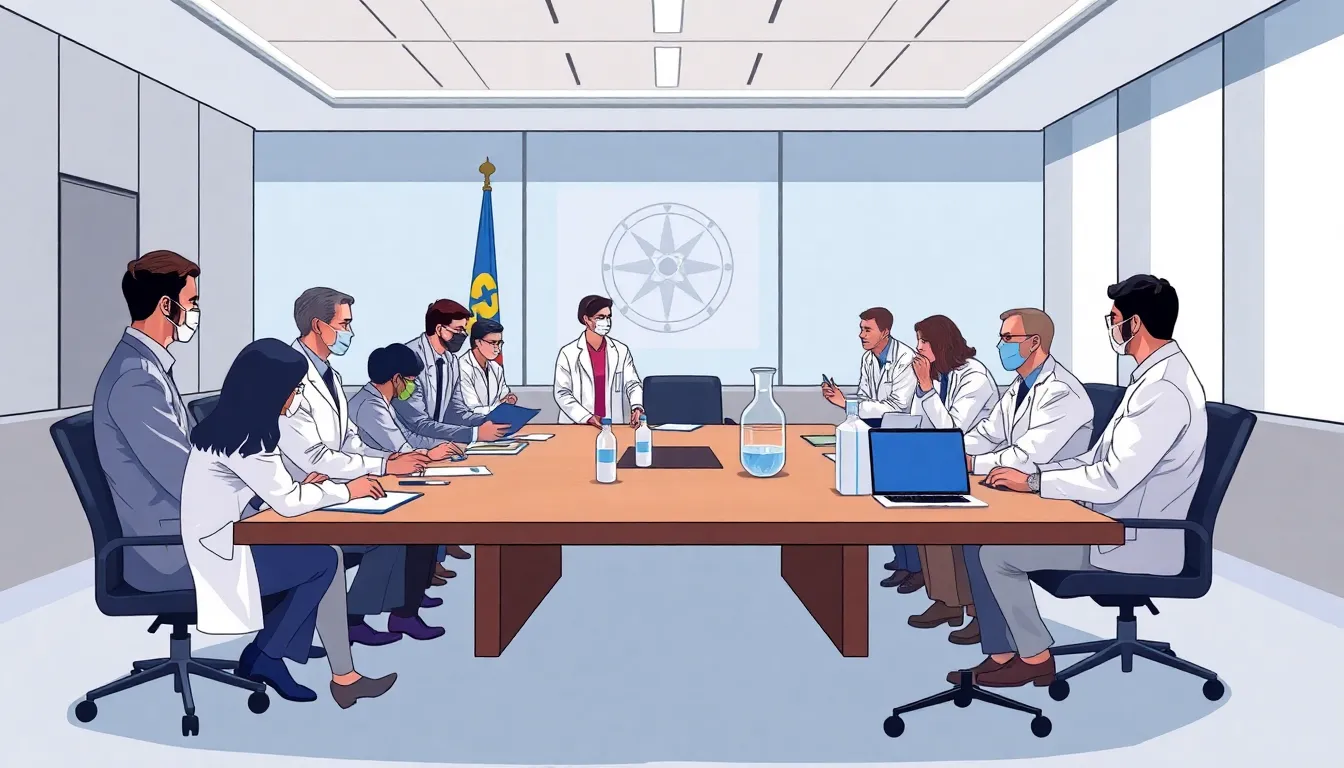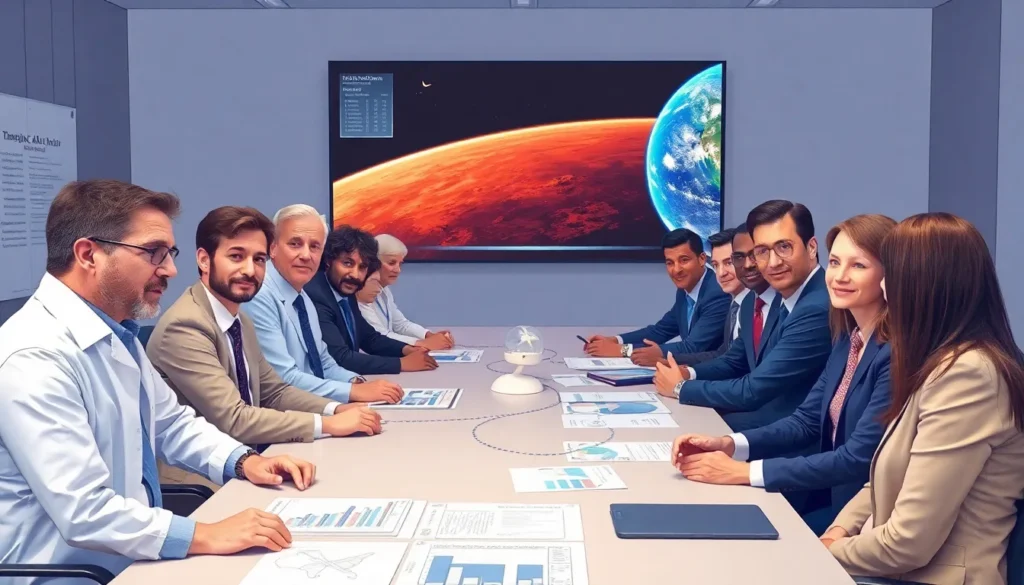In a world where the next big discovery could be just a rocket launch away, the Science, Space, and Technology Committee stands at the forefront of innovation. Think of them as the ultimate nerd squad, armed with knowledge and a mission to explore the universe while keeping our feet firmly planted on Earth. From groundbreaking research to interstellar adventures, they’re the ones making sure we don’t accidentally send our coffee machines to Mars.
Table of Contents
ToggleOverview of Science Space and Technology Committee
The Science, Space, and Technology Committee plays a crucial role in shaping policies related to scientific research and space exploration. This committee focuses on promoting innovation through rigorous oversight and support for evolving technologies. It ensures that projects meet established standards and effectively reach targeted goals.
Members of the committee include experts from various scientific disciplines, who contribute insights that drive decision-making. Regular hearings allow members to gather testimony from industry leaders and researchers, fostering collaboration and transparency. Initiatives such as funding for research projects and advancements in space technology reflect the committee’s commitment to exploration and safety.
Key areas of focus encompass environmental science, energy policy, and space operations. The committee examines legislation that impacts the advancement of these fields, prioritizing the potential benefits for both society and the economy. Engaging with stakeholders ensures that national interests align with scientific progress.
In recent years, the committee has addressed issues related to climate change, renewable energy sources, and cybersecurity in technology use. Legislative measures aim to facilitate growth in these areas, promoting sustainable practices and safeguarding information systems. As technological capabilities expand, the need for regulatory frameworks becomes increasingly important.
Enhanced communication between scientific organizations and policymakers is prioritized to address emerging challenges. Through public outreach and educational programs, the committee raises awareness about scientific endeavors and their societal implications. Effective advocacy for science and technology helps prepare for future advancements that align with national priorities.
Functions of the Committee

The Science, Space, and Technology Committee engages in critical functions that drive innovation and guide research efforts within its purview. Key responsibilities include legislative oversight and monitoring scientific agencies, ensuring technology serves national interests effectively.
Legislative Responsibilities
Legislative responsibilities focus on crafting and reviewing laws that influence scientific research and space exploration. Members assess proposed legislation, ensuring policies foster innovation and address pressing issues like climate change and renewable energy. This diligence guarantees that congressional actions reflect scientific understanding and public needs. During hearings, committee members gather expert testimonies to inform decision-making processes. Proposals that emerge from these discussions aim to create a balanced approach that promotes growth while addressing potential risks.
Oversight of Scientific Agencies
Oversight of scientific agencies plays a vital role in maintaining accountability and integrity. The committee evaluates the performance of agencies like NASA and the National Science Foundation to ensure they adhere to goals and budgets. Regular reviews highlight successes and areas requiring improvement. Transparency is crucial in this oversight process, as it enables public trust in scientific initiatives. The committee also emphasizes the importance of strategic partnerships among agencies, fostering collaboration that enhances scientific capabilities and promotes effective technological advancements.
Key Areas of Focus
The Science, Space, and Technology Committee targets various critical areas that drive innovation and exploration. These areas include space exploration initiatives and technological advancements.
Space Exploration Initiatives
The committee oversees numerous space exploration initiatives aimed at expanding human knowledge and capacity. Members evaluate legislation that supports missions to Mars, lunar landings, and the study of asteroids. Strategies emphasize international collaboration to pool resources and expertise. Partnerships among agencies like NASA and international space organizations enhance mission success. Moreover, committee members prioritize safety and environmental considerations during all stages of missions. Regular hearings gather insights from experts to refine these initiatives. Insights help craft policies ensuring sustainable space exploration for future generations.
Technological Advancements
Technological advancements receive significant attention from the committee to support innovation. They monitor emerging technologies in fields like artificial intelligence, biotechnology, and cybersecurity. Emphasis is placed on ensuring that technological developments align with national interests and ethical guidelines. Regular assessments facilitate adjustments to legislation and funding strategies. Collaboration between the private sector and government enhances research and application of new technologies. Public-private partnerships often lead to breakthroughs in various scientific domains. Additionally, transparency in technological processes fosters public trust and engagement with scientific undertakings.
Recent Achievements
The Science, Space, and Technology Committee has made significant strides in the past year. Legislation focused on climate change received strong support, emphasizing the need for sustainable practices across industries. Recent initiatives aimed at renewable energy have helped position the country as a leader in innovative energy solutions.
Space exploration programs achieved notable milestones, including successful missions aimed at Mars and advanced lunar landings. Successful collaborations with international partners have bolstered these efforts, enhancing both scientific knowledge and safety protocols. The committee also facilitated advancements in addressing cybersecurity threats, ensuring that information systems remain secure.
Public engagement initiatives gained traction, raising awareness about the societal implications of scientific endeavors. Testimonies gathered from industry leaders and researchers during hearings highlighted critical issues facing the scientific community. Enhanced communication between scientific organizations and policymakers resulted in actionable strategies to tackle pressing challenges.
Budgetary allocations focused on technological advancements in artificial intelligence and biotechnology. Recent assessments of agencies like NASA emphasized accountability, ensuring that taxpayer resources contribute effectively to national interests. Transparency remained a cornerstone of their oversight, fostering public trust in scientific projects.
Moreover, the committee championed public-private partnerships to drive research and application of emerging technologies. Strategic partnerships among various agencies bolstered scientific capabilities, promoting effective advancements in research and exploration. Prioritization of these collaborative efforts continues to yield positive outcomes for innovation in science and technology.
Future Goals and Challenges
The Science, Space, and Technology Committee aims to enhance innovation in scientific research and space exploration. Prioritization of sustainable practices ranks high among their future goals, particularly in combating climate change and promoting renewable energy.
Addressing emerging technologies, the committee emphasizes the ethical implications associated with fields like artificial intelligence and biotechnology. Regular evaluations of legislation ensure alignment with national interests, guiding the development of policies that foster innovation.
Members consistently strive for international collaboration to enhance safety in space missions. Collaboration with industry leaders strengthens public-private partnerships, fostering an environment conducive to technological advancements. Initiatives targeting public engagement raise awareness about the societal implications of scientific research.
Budgetary decisions focus on allocating resources effectively for emerging technologies and critical research areas. Comprehensive assessments of agencies, such as NASA and the National Science Foundation, maintain transparency and accountability. Identification of new legislative measures will tackle pressing issues in cybersecurity and data protection, addressing vulnerabilities in current systems.
Challenges persist in balancing rapid technological developments with ethical considerations. Navigating funding obstacles remains crucial for sustained research initiatives in space and scientific fields. Continued dialogue with experts across disciplines enhances the committee’s ability to adapt to shifting landscapes in science and technology.
Together, these goals and challenges highlight the committee’s commitment to guiding responsible exploration. Emphasis on collaboration, transparency, and innovation drives their agenda forward, ensuring advancements benefit society and align with national interests.
The Science, Space, and Technology Committee stands as a vital force in shaping the future of scientific exploration and technological advancement. Its commitment to responsible oversight and innovation ensures that the nation remains at the forefront of research while addressing pressing challenges like climate change and cybersecurity.
By fostering collaboration between public and private sectors, the committee enhances the effectiveness of scientific initiatives and promotes transparency. As it navigates the complexities of emerging technologies and international partnerships, the committee’s dedication to aligning scientific progress with national interests will continue to yield significant benefits for society. The path forward is bright as they champion sustainable practices and ethical considerations in the ever-evolving landscape of science and technology.




